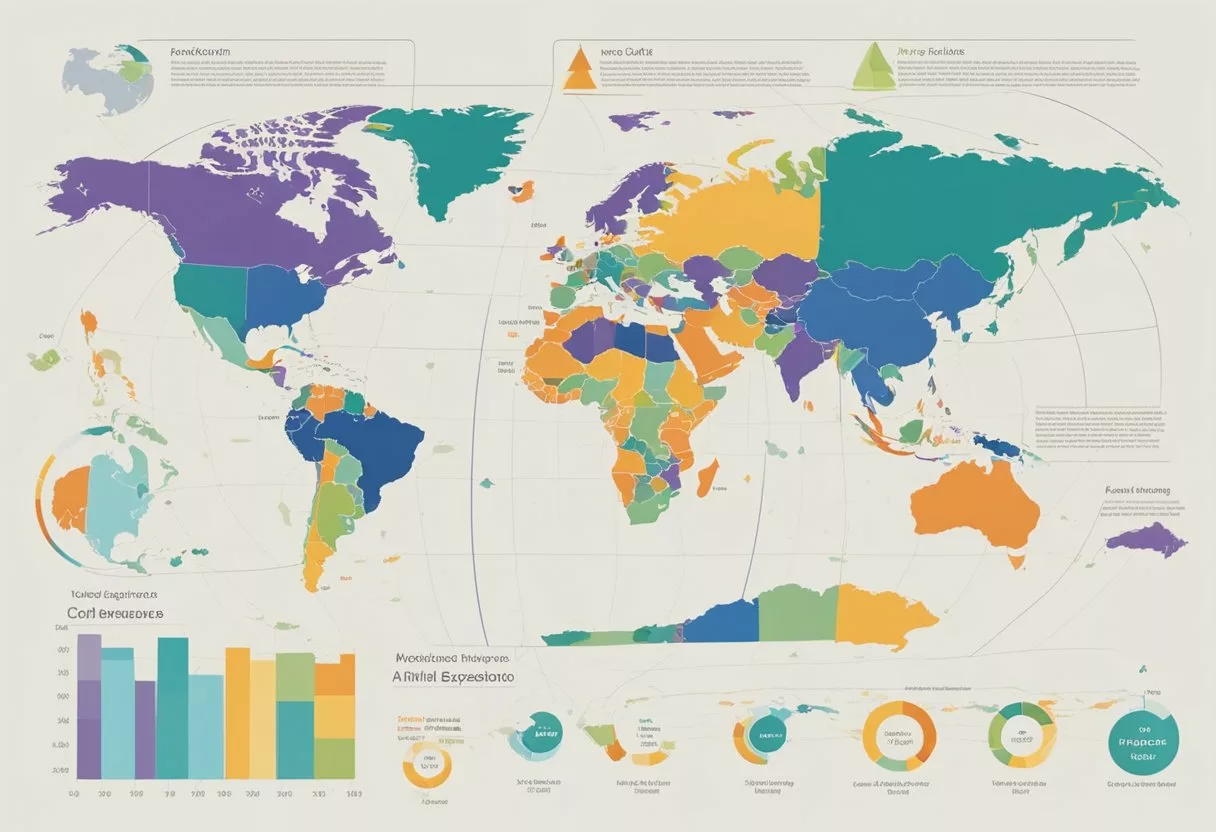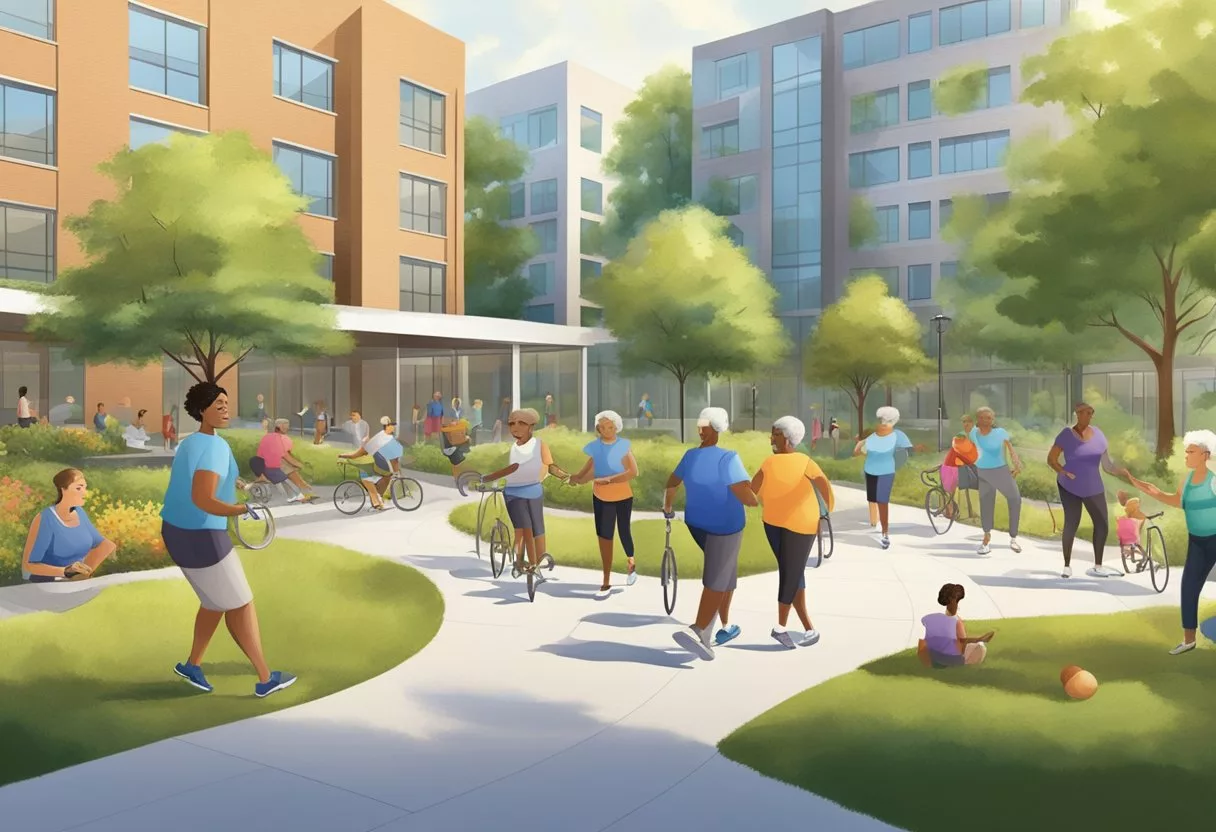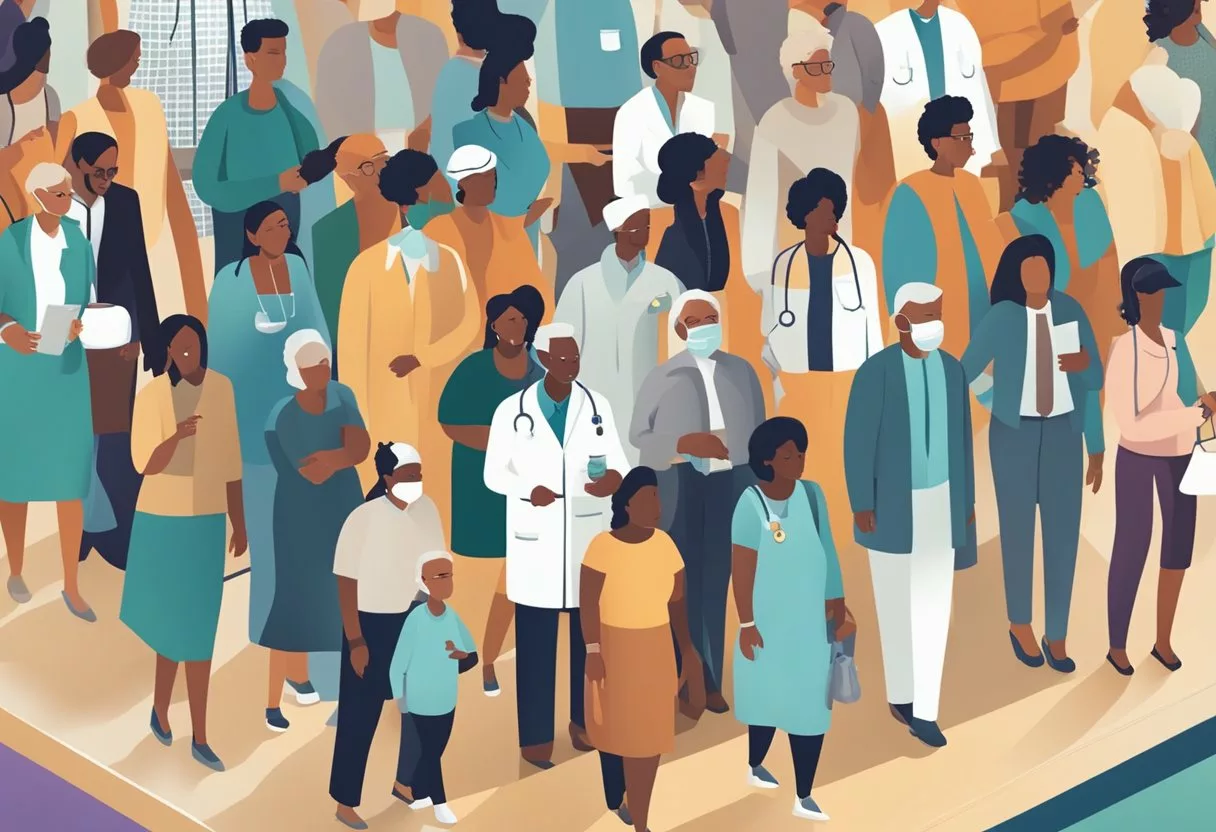Living longer and better is a goal for many people. Scientists are making big steps in learning about aging. They are finding ways to slow it down and help us stay healthy as we get older. Longevity research is booming, with experts looking at how our bodies age at a basic level.
Life expectancy has gone up a lot in the past 70 years. In 1950, people lived to about 47 on average. Now, it’s up to 73. By 2050, it might reach 77. This means more people are living into their 80s and beyond.
But not everyone gets to live longer. Some groups face bigger health problems that cut their lives short. Fixing these differences could help more people live longer, healthier lives.
Key Takeaways
- Scientists are making progress in understanding and potentially slowing the aging process
- Global life expectancy has increased significantly since 1950 and is expected to keep rising
- Health disparities between groups affect longevity and need to be addressed
Medical Advances and Longevity

New medical discoveries and treatments are changing how long people live. These advances help fight diseases and improve health for many.
Progress in Treating Chronic Diseases
Heart disease and diabetes treatments have gotten much better. Doctors now use special medicines to lower cholesterol and control blood sugar. This helps people live longer with these conditions.
New drugs for high blood pressure work better than old ones. They have fewer side effects too. This makes it easier for patients to take their medicine every day.
Researchers are finding ways to slow down Alzheimer’s disease. Some new treatments may help people keep their memory longer. This could let older adults stay independent for more years.
Cancer Research and Longevity
Cancer used to be a death sentence for many. Now, new treatments give patients hope.
Immunotherapy teaches the body to fight cancer cells. It works well for some types of cancer that were hard to treat before.
Targeted therapies attack specific parts of cancer cells. This causes less harm to healthy cells. Patients often feel better during treatment.
Early detection tests catch cancer sooner. Doctors can treat it before it spreads. This means more people survive and live longer after a cancer diagnosis.
Impact of Public Health Initiatives
Clean water and good sanitation stop many diseases. This helps whole communities stay healthier.
Vaccine programs prevent serious illnesses. They save millions of lives each year. New vaccines, like the one for HPV, may prevent certain cancers.
Anti-smoking campaigns have cut lung cancer rates. Fewer people smoke now than in the past. This improves health for smokers and those around them.
Healthy eating programs fight obesity. They teach people to eat better foods. This lowers the risk of many health problems as people age.
Global Trends in Life Expectancy

Life expectancy worldwide has seen major changes in recent decades. People are living longer in most parts of the world. But big gaps still exist between rich and poor countries.
Rise of Global Life Expectancy
Global life expectancy has grown a lot since 1800. Back then, no place had a life expectancy over 40 years. By 2021, the world average reached 70 years. This big jump happened in just 200 years.
Many factors led to this rise:
- Better food and nutrition
- Clean water and sanitation
- Medical advances
- Public health programs
Today, Japan, Switzerland, and Singapore have some of the highest life expectancies. People there can expect to live past 80 years old on average.
Socioeconomic Factors and Longevity
Poverty and low status still hurt life expectancy in many places. Rich countries tend to have higher life expectancies than poor ones. Even within countries, wealth affects how long people live.
Key points:
- Education level impacts longevity
- Access to healthcare varies by income
- Job type and work conditions matter
- Diet quality often links to income
Reducing these gaps could help more people live longer. Efforts to improve health for all groups may boost life expectancy worldwide.
The Impact of Pandemics on Longevity

Pandemics can dramatically affect life expectancy and longevity trends. Recent events have shown how infectious diseases can disrupt years of progress in public health.
COVID-19 Pandemic and Longevity
The COVID-19 pandemic caused global life expectancy to drop by 1.6 years between 2019 and 2020. This decline was unprecedented in recent history.
In just two years, the pandemic erased nearly a decade of progress in improving life expectancy. Global life expectancy fell to 71.4 years in 2021, back to 2012 levels.
The impact varied across countries and demographics. Age and sex played a role in how COVID-19 affected different populations.
Infectious Diseases and Aging Populations
Infectious diseases pose a unique threat to aging populations. Older adults often have weaker immune systems, making them more vulnerable to severe illness.
Pandemics can disproportionately affect the elderly, leading to higher mortality rates in this group. This can significantly impact overall life expectancy statistics.
Public health measures and medical advancements are crucial in mitigating the effects of infectious diseases on longevity. Vaccines, treatments, and preventive strategies play key roles in protecting vulnerable populations.
Longevity and Society

People are living longer, changing how society works. This impacts the economy and government policies in big ways.
Population Aging and the Economy
As people live longer, there are more older adults in society. This shift affects the job market and economy. Many older people keep working past typical retirement age. They bring experience but may need new skills.
Longer lifespans mean retirement savings must last longer. This puts pressure on pensions and social security systems. Healthcare costs also go up as people age.
But there are positives too. Older adults often volunteer and help their families. They can boost local economies by spending money on services.
The Role of Government and Policies
Governments play a key part in dealing with longer lifespans. They must balance caring for older citizens with other needs. Many are raising retirement ages to match longer lives.
Policies aim to help older adults stay healthy and active. This includes promoting exercise and good diets. Some places offer free classes or gym access for seniors.
Financial security is a big concern. Governments are looking at ways to strengthen social security and pension systems. They also encourage people to save more for retirement.
Health policies focus on managing chronic diseases. This helps older adults stay independent longer. Some countries are testing new care models for the elderly.
Health Disparities and Longevity

Life expectancy varies greatly depending on factors like race, ethnicity, and location. These differences reflect wider inequalities in health and access to care across populations.
Understanding the Longevity Gap
Life expectancy differences between groups can be substantial. Race and ethnicity play a major role. Some communities face higher rates of disease and earlier death.
Poverty is closely linked to shorter lifespans. People in low-income areas often lack access to quality healthcare and nutrition. This can lead to chronic health issues.
Location matters too. Rural areas may have fewer doctors and hospitals. Some counties have much lower life expectancy than others nearby.
Addressing Inequalities in Health
Tackling health disparities requires a multi-pronged approach. Improving access to healthcare is crucial. This includes both preventive care and treatment for chronic conditions.
Education about healthy habits can make a big difference. Programs teaching nutrition and exercise help boost healthy longevity.
Economic factors must be addressed. Job opportunities and affordable housing contribute to better health outcomes. Community investments can reduce stress and improve quality of life.
Research is key to understanding and closing gaps. Studying successful interventions helps create targeted solutions for different groups.
The Future of Aging Research

Aging research is advancing rapidly, with new technologies and cross-disciplinary approaches driving progress. Scientists are making breakthroughs in understanding the biological processes of aging and developing potential interventions to extend healthy lifespans.
Innovations in Gerontology
Geroscience is pushing the boundaries of aging research. Scientists are exploring ways to reverse aging at the cellular level. This includes targeting senescent cells, which accumulate as we age and contribute to tissue dysfunction.
Another promising area is epigenetic reprogramming. Researchers are investigating how to reset cellular age markers without altering DNA sequences. This could potentially rejuvenate tissues and organs.
Advances in gene therapy and CRISPR technology may allow for precise genetic modifications to combat age-related diseases. Scientists are also developing biomarkers to measure biological age more accurately than chronological age.
Interdisciplinary Approaches to Aging
The future of aging research lies in collaboration across fields. Biologists, computer scientists, and data analysts are working together to uncover aging patterns and develop interventions.
Artificial intelligence is playing a crucial role in analyzing vast amounts of genetic and health data. This helps identify new targets for anti-aging therapies and predict individual aging trajectories.
Lifestyle factors are increasingly recognized as key to longevity. Nutritionists, exercise physiologists, and psychologists are collaborating to develop holistic approaches to extend healthy life expectancy.
Economists and sociologists are studying the societal impacts of increased longevity. Their work informs policies to support aging populations and maximize the benefits of extended healthy lifespans.
Longevity Interventions and Treatments

Scientists are exploring various ways to extend human lifespan and improve health in later years. These approaches include both medical treatments and lifestyle changes that aim to slow down the aging process.
Pharmaceutical Approaches
Researchers are testing several drugs that may help people live longer. One promising medicine is rapamycin, which affects cell growth and has shown life-extending effects in animals.
Metformin, a diabetes drug, is being studied for its potential anti-aging properties. It may help reduce the risk of age-related diseases.
Scientists are also looking at senolytic drugs. These medications target and remove old, damaged cells from the body. Early tests suggest they could improve health and extend lifespan.
Other drugs being researched include:
- NAD+ boosters
- Sirtuin activators
- Stem cell therapies
Lifestyle Interventions
Simple changes in daily habits can have a big impact on longevity. Diet plays a key role in healthy aging. Eating lots of fruits, vegetables, and whole grains while limiting processed foods is recommended.
Regular exercise is crucial for living longer. It helps maintain muscle strength, heart health, and brain function. Aim for at least 150 minutes of moderate activity each week.
Intermittent fasting has gained attention for its potential health benefits. This eating pattern involves cycling between periods of eating and fasting. It may help improve metabolism and reduce inflammation.
Other important lifestyle factors include:
- Getting enough sleep
- Managing stress
- Staying socially active
- Avoiding smoking and excessive alcohol
The Role of Personal Habits

Personal habits play a crucial role in determining longevity. Lifestyle choices can significantly impact health outcomes and life expectancy.
Smoking and Alcohol
Smoking is a major risk factor for early death. It increases the chances of heart disease, lung cancer, and other serious illnesses. Quitting smoking at any age can add years to one’s life.
Excessive alcohol consumption also shortens lifespan. It can lead to liver disease, certain cancers, and accidents. Moderate drinking or abstaining entirely is linked to better health outcomes.
Studies show that avoiding smoking and heavy drinking are key habits for healthy longevity. People who avoid these habits tend to live longer, healthier lives.
Obesity and its Consequences
Obesity is a growing health concern worldwide. It increases the risk of many serious health conditions, including:
- Type 2 diabetes
- Heart disease
- Certain cancers
- Osteoarthritis
Maintaining a healthy weight through diet and exercise is crucial for longevity. People at a healthy weight typically have lower rates of chronic diseases and live longer.
Obesity often leads to higher mortality rates. It puts extra strain on the body’s organs and systems. Losing weight, even a small amount, can improve health outcomes and increase life expectancy.
Healthy eating habits and regular physical activity are key to managing weight. These habits not only prevent obesity but also promote overall health and longevity.
Longevity in the Private Sector

Companies are making big strides in extending human lifespans. They focus on new drugs, health products, and ways to invest in longevity.
Biotech and Pharma Innovations
Biotech firms are creating new drugs to slow aging. Some target specific parts of cells that break down as we get older. Others aim to boost the body’s natural repair systems.
Many companies work on gene therapies. These can fix faulty genes linked to age-related diseases. Some research looks at ways to make stem cells work better as we age.
Pharma giants invest billions in anti-aging research. They test drugs that might extend healthy lifespans. A few have shown promise in early trials.
Longevity Market and Investments
The longevity market is growing fast. It includes health tech, fitness apps, and special foods for older adults. Many startups focus on home care tech to help seniors live independently.
Investors see big potential in longevity. Venture capital firms create funds just for anti-aging startups. Some focus on fertility treatments to help people have children later in life.
Big tech companies enter the field too. They use AI to find new anti-aging compounds. Some work on wearable devices to track health and predict problems early.